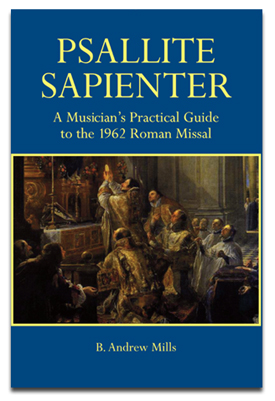A Musician's Guide to the 1962 Missal
-
Just a heads up that we are making fast progress on printing a new book. It is called Psallite Sapienter: A Musician's Guide to the 1962 Missal. It is by B. Andrew Mills, organist and choirmaster (and famous at that!) at St. Agnes in New York. It is the one reference that any EF musician needs, and it is indeed comprehensive and super clear. It covers the forms and what is required, and the expectations and needs of the full liturgical year, plus weddings, funerals, and etc. It combines a comprehensive understanding of the rubrics with the author's own extensive experience in the EF, which is particularly useful since the author understands the ordinary form as well and the differences. This one book does the work of a full library on the topic of the extraordinary form, telling musicians just what they need to know.
We have it set to sell for $13. Actually, while we wait for the full print run, you can buy it here.
-
It will be there.
-
100 copies just arrived! It looks wonderful! very happy about this. It lives! It is real!
-
I have notification from Lulu that my copy is on its way here!
-
Mine just arrived in S. Florida. Awfully big box for such a small book. After looking it over briefly I can say that it has value as kind of a primer. It won't replace my Fortescue-O'Connell book since it does not offer any ceremonial information. A couple of nits to pick:
p. 12 I have a slight problem with using "choir" instead of "schola" since this can lead to confusion with a liturgical choir vis. polyphonic singers
p. 12 "The modern use of the word cantor is wholly alien to the Roman Rite" is absolutely wrong as stated. I know that he means the it is wholly alien to the "extraordinary form of the Roman Rite." The OF is also the Roman Rite.
That's really it. The rest is a nice streamlined description of what is sung at the EF. Basic instructions for what can and should not be sung at high, cantata, and low Masses are helpful. I guess I would have liked to see the basic ceremonial actions of the schola and some mention of what the Church says about the gender in the schola. For example, does a mixed or female schola sing in the choir (if there is one)? These areas are completely avoided in the text but are subjects that new scholas want to know about. Personally, I love wading through Fortescue, but even that source sometimes forgets to mention when the schola should stand and sit and such.
Thanks to Andrew Mills for bringing this out. If he does a 2nd edition, I humbly request that he consider including those things I mentioned. -
"The modern use of the word cantor *to mean a leader of song* is wholly alien to the Roman Rite" is what I wrote, and I stand by it. It doesn't matter which form you're in -- the rubrics refer to "cantores" as those who intone chants and sing verses, etc., not the cheerleaders who gesture from microphones. Having fielded enquiries from many "cantors" looking for work at St. Agnes, I believe it is an important point to emphasize.
-
Both this review and the response are much appreciated!
-
Apologies for leaving out that phrase, but the GIRM states very clearly (emphasis mine):
104. It is fitting that there be a cantor or a choir director to lead and sustain the people's
singing. When in fact there is no choir, it is up to the cantor to lead the different chants, with the
people taking part.
Now I do agree with Andrew Mills on this. I don't think it is appropriate to have a single voice dominating the congregational singing, but I still think that it is hardly "alien" to the OF of the Roman Rite. -
Ok, this book is now online at Scribd. If you are doing the EF, this is invaluable!
-
That. Is. Amazing!
-
"If you are doing the EF, this is invaluable!"
Now all I need to do is click my heels three times and say, I wishI were doing the EF, I wish I were doing the EF...
('though I already got my copy, on spec as it were.)
(Save the Liturgy, Save the World) -
Diapason (May 2009) page 12 column 1
Here & There
Brietkopf ...
Church Music Association of America announces the release of Psallite Sapienter: A Musician's Guide to the 1962 Missal, by B. Andrew Mills. The author provides a comprehensive guide to providing music for the Extraordinary Form of the Roman Rite. It covers the types of sung Masses and what is required of the organist and choir, and the expectations and needs of the full liturgical year, plus weddings, funerals, and Benediction. The book combines an explanation of the rubrics with the author's own experience with the 1962 Missal. For information: < musicasacra.com/books >.
Welcome to the MusicaSacra Forum!
To participate in the discussions on Catholic church music, sign in or register as a forum member, The forum is a project of the Church Music Association of America.
Categories
- All Discussions21,281
- General Music Discussion8,297
- Job Openings216
- Management of Music Programs852
- Choral Matters534
- Church Documents and Rubrics528
- CMAA Notes304
- Events730
- For Newcomers: Read First26
- Sacred Polyphony550
- Hymnody875
- Gregorian Chant: General2,711
- ↳ Graduale Romanum and Liber Usualis370
- ↳ Graduale Simplex60
- ↳ Semiology63
- Vernacular Plainsong698
- Anglican Use and Anglican Chant68
- Organ, Other Instruments and Repertoire438
- New Composition/Works in Progress1,302
- Recordings234
- Music for Hispanic Ministry162
- Music Education: Children213
- Music Education: General222
- News Items245
- Positions Wanted3
- General Discussion: Catholicism740
- Amusements177
- General Discussion1,037
- Opinions119



